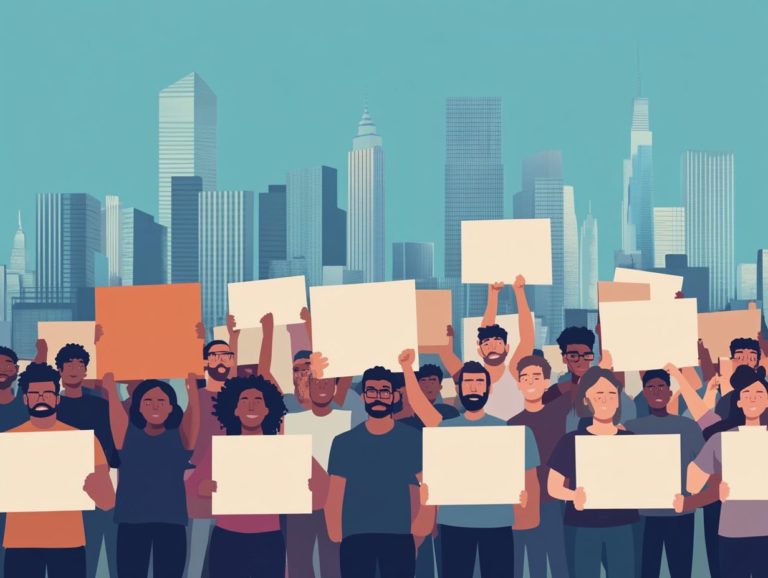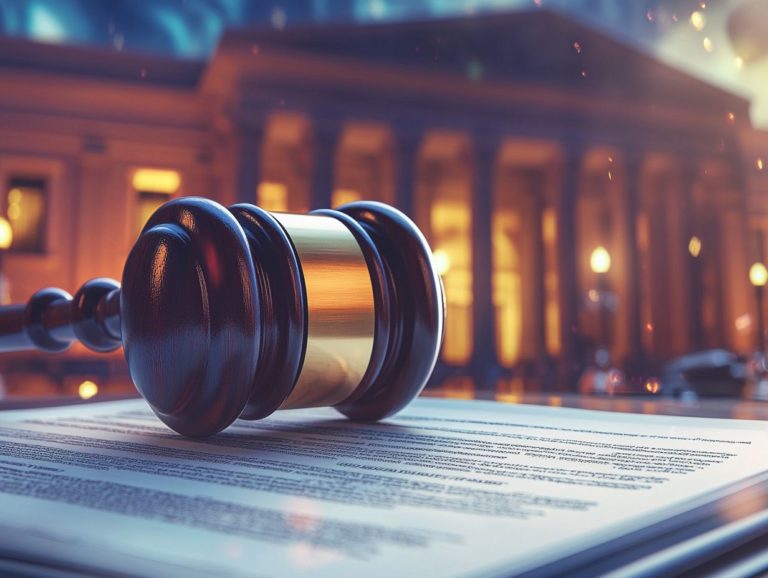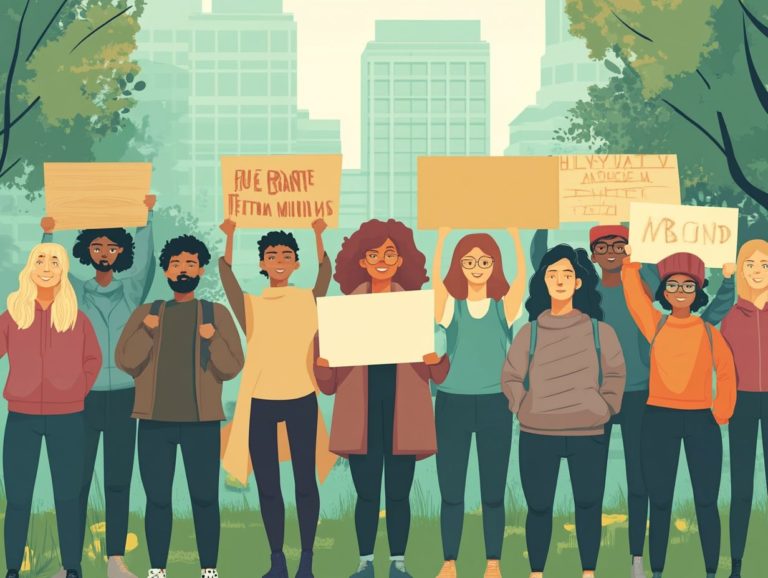10 Rights You Should Never Ignore
In a world where individual freedoms and dignity hold immense significance, grasping your rights is essential.
This article delves into ten fundamental human rights that underpin a just society. From the freedom of expression to the right to a fair trial, each of these rights safeguards individuals from injustice and discrimination.
You ll discover the importance of advocating for your rights. Learn what steps to take when they are violated. Join us as we explore why these rights are crucial and how they influence your life.
Contents
- Key Takeaways:
- 1. Right to Freedom of Speech and Expression
- 2. Right to a Fair Trial
- 3. Right to Privacy
- 4. Right to Education
- 5. Right to Vote
- 6. Right to Equal Treatment and Protection Under the Law
- 7. Right to a Safe and Healthy Environment
- 8. Right to Practice Your Religion
- 9. Right to Access Information
- 10. Right to Basic Necessities and a Decent Standard of Living
- What Are Human Rights and Why Are They Important?
- Frequently Asked Questions
- What are the 10 rights you should never ignore?
- Is it important to know and understand these 10 rights?
- What is the significance of the right to life, liberty, and security of person?
- Why is the right to privacy important?
- What is the right to education, and why does it matter?
- What should I do if my rights are being violated?
- Know Your Rights
- 10 Fundamental Rights
Key Takeaways:
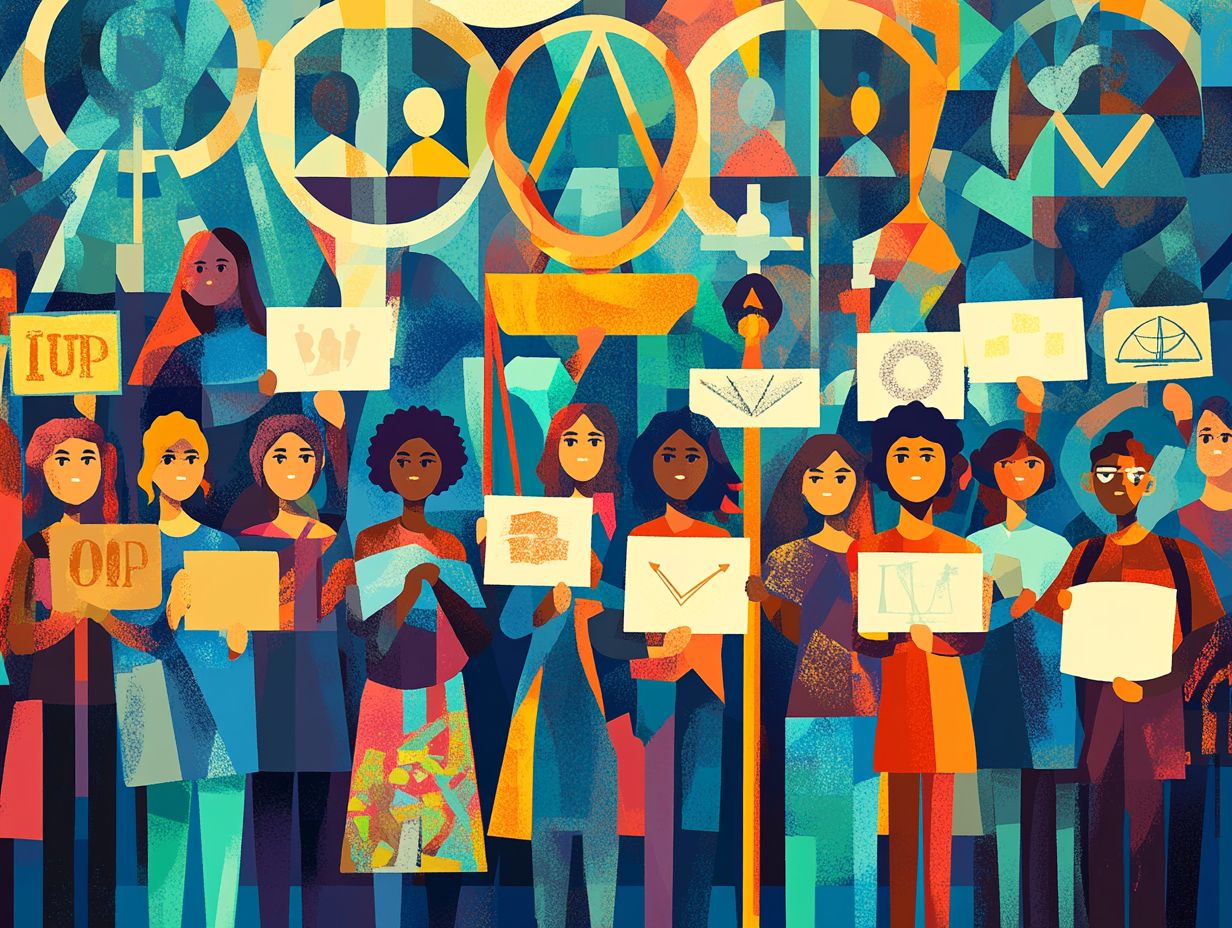
Your voice is powerful never hesitate to speak up!
Everyone deserves a fair trial don t let anyone take this right away.
Your privacy is important protect it at all costs.
1. Right to Freedom of Speech and Expression
The right to freedom of speech and expression is a fundamental pillar of democracy in the U.S. It is beautifully enshrined in the First Amendment.
This right allows you to voice your opinions and share your ideas. You can challenge authority without fear of censorship.
It enables public discourse, advocacy for social justice, and engagement with critical issues related to civil rights and discrimination, contributing to a rich and diverse society.
Organizations like the American Civil Liberties Union (ACLU) are essential in safeguarding these rights, especially in the face of legislative and judicial challenges.
This vital right has details and limitations, particularly when intersecting with hate speech, national security, or incitement to violence.
Landmark cases such as Schenck v. United States and Tinker v. Des Moines highlight the balance between exercising free expression and maintaining societal safety.
The ACLU s involvement in these cases shows its commitment to navigating the complexities of free speech, ensuring even unpopular opinions receive protection.
Legislation like the Civil Rights Act emphasizes that while your speech is free, it also comes with responsibilities and consequences that shape our societal values.
2. Right to a Fair Trial
The right to a fair trial is a cornerstone of the legal framework in the U.S. It ensures that justice is served impartially.
This principle protects you from wrongful convictions and guarantees access to adequate legal counsel when you need it most.
This essential right includes fundamental elements like the presumption of innocence. This means you are considered innocent until proven guilty in court, a vital safeguard for your freedom.
The courts serve as neutral arenas where evidence is presented and fair evaluations are made. Landmark cases, such as Gideon v. Wainwright, highlight the necessity of access to legal counsel not just as a convenience but as essential for a proper defense.
Judges and juries must approach each case without bias. This impartiality upholds the integrity of the justice system.
3. Right to Privacy
The right to privacy, enshrined in the Fourth Amendment of the U.S. Constitution, protects you from unreasonable searches and seizures.
This fundamental principle has evolved significantly through landmark cases that have shaped our current understanding of privacy in the digital age.
In cases like Riley v. California, the Supreme Court ruled that digital data on cell phones marks a significant shift in privacy expectations. The government generally needs a warrant before accessing such personal devices.
Similarly, United States v. Tugwell showcased the intricate intersections of technology and civil liberties, sparking ongoing debates about surveillance and consent.
As you navigate an increasingly digital society, understanding these implications is essential. They delineate your personal boundaries and influence broader discussions on civil rights across the nation.
4. Right to Education
The right to education in the U.S. stands as a fundamental civil right, ensuring that everyone has access to quality education, no matter their race, gender, or socioeconomic status. This principle promotes equality and social mobility for all individuals.
Throughout history, key events and legislation have significantly influenced this right, tackling deep-seated issues of discrimination that have long affected the educational landscape.
Landmark court cases, such as Brown v. Board of Education, redefined public schooling by declaring racial segregation unconstitutional. The Elementary and Secondary Education Act established the foundation for federal educational funding, ensuring that marginalized communities received essential resources.
The Individuals with Disabilities Education Act further expanded access for students with disabilities, highlighting the importance of inclusive education. Together, these legal milestones exemplify a strong commitment to fostering educational equity, reflecting the ongoing struggle to achieve genuine accessibility for everyone.
5. Right to Vote
The right to vote stands as a fundamental pillar of democracy in the U.S., enabling you to engage in the political process and hold elected officials accountable, all while protecting against discrimination and being unable to vote.
This essential right has experienced significant transformations throughout history, mirroring the nation’s evolving understanding of equality and justice. The passage of the Voting Rights Act in 1965 was a pivotal moment, aimed at dismantling barriers that had systematically oppressed marginalized groups, particularly African Americans in the South.
Challenges remain, such as voter ID laws and gerrymandering, along with other tactics that disproportionately affect underrepresented communities. Boosting voter turnout is crucial! It not only amplifies diverse voices but also strengthens the democratic process, serving as a reminder to elected officials of their responsibility to all constituents.
6. Right to Equal Treatment and Protection Under the Law
The right to equal treatment and protection under the law stands as a cornerstone of civil rights in the U.S., guaranteeing that every individual, regardless of background, is treated with fairness and free from discrimination.
This principle is backed by important laws, most notably the Civil Rights Act of 1964, which expressly prohibits discrimination based on race, color, religion, sex, or national origin. Significant Supreme Court cases, such as Brown v. Board of Education, further reinforced this commitment by declaring that racial segregation in public schools is fundamentally unequal.
In everyday life, many individuals encounter discrimination based on various characteristics like age, gender, and disability. Fortunately, the legal system offers remedies, including lawsuits and equitable relief, ensuring that those affected have avenues to seek justice and hold wrongdoers accountable for their actions.
7. Right to a Safe and Healthy Environment
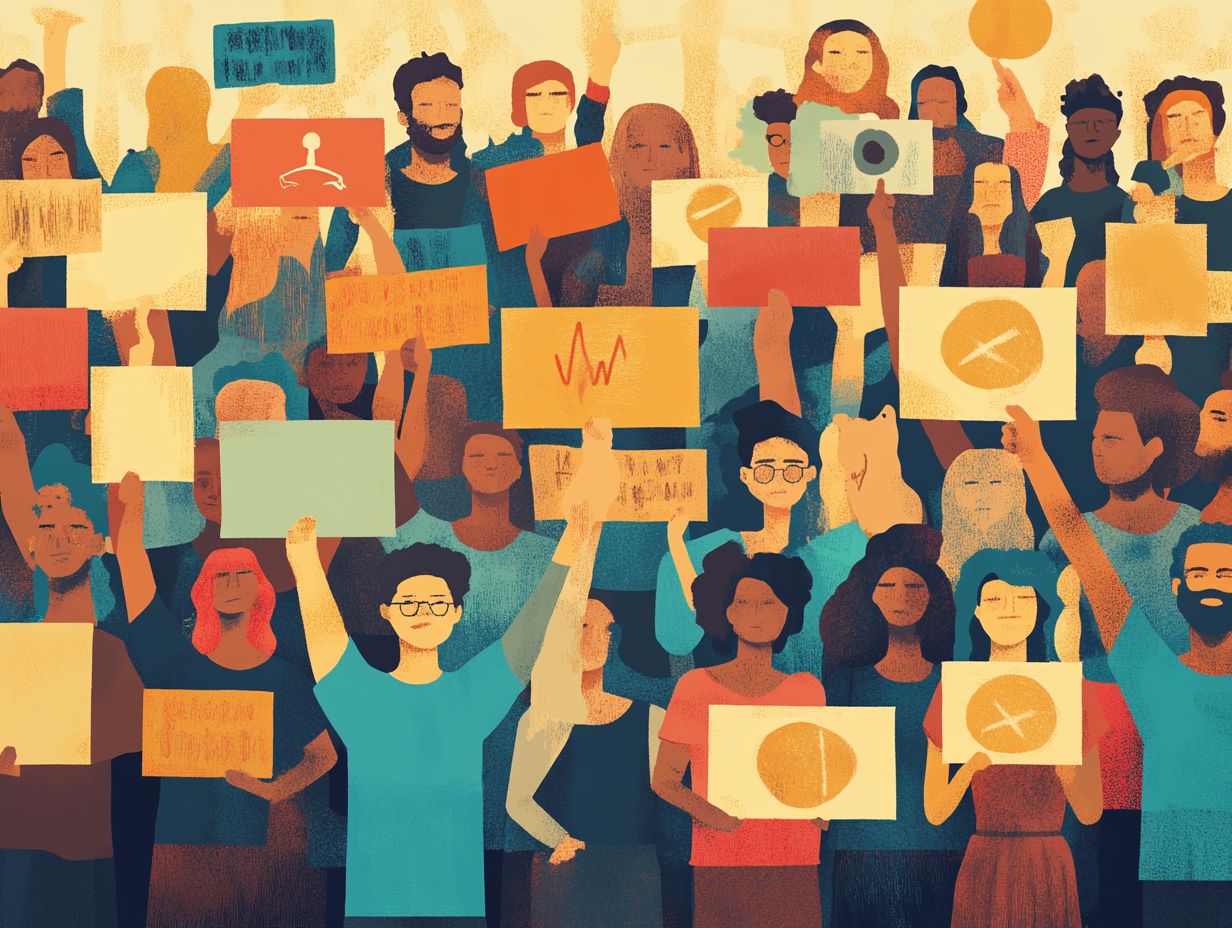
The right to a safe and healthy environment is increasingly acknowledged as vital for your well-being, especially for children. This includes ensuring that environmental regulations adequately protect public health and the rights of animals.
These regulations are crucial in safeguarding not only the physical health of your community but also the emotional and psychological welfare of future generations. Initiatives like the Clean Air Act and the Clean Water Act help keep our air and water clean and safe, allowing children to flourish in a safe atmosphere while setting a precedent for responsible environmental stewardship.
Legislation that prioritizes animal welfare, such as the Animal Welfare Act, underscores the importance of humane treatment and reflects societal values that champion the rights of all living beings. By supporting these frameworks, you contribute to fostering a healthier planet and nurturing a more compassionate future for generations to come.
8. Right to Practice Your Religion
The right to practice your religion freely is a fundamental civil right in the U.S. This law allows you to express your beliefs without facing discrimination or persecution.
This essential freedom also embraces collective practices, allowing communities to unite in their spiritual observances.
Landmark court cases, like Employment Division v. Smith, shape our understanding of religious liberties. Civil rights organizations advocate for those whose beliefs clash with societal norms.
As you navigate this complex landscape, a balance is often necessary. Disputes may arise between religious expression and other civil rights, highlighting the ongoing dialogue about respect for diverse beliefs.
9. Right to Access Information
The right to access information is essential for a thriving democracy. It enables you to make informed decisions and hold your government accountable.
This principle is rooted in laws like the Freedom of Information Act. This act allows you to request federal agency records to promote transparency.
When seeking public information, having a lawyer can help you navigate complex processes. This ensures your right to information is actively protected.
10. Right to Basic Necessities and a Decent Standard of Living
The right to basic necessities is fundamental to your dignity and well-being. This includes access to food, shelter, healthcare, and education for all citizens.
Programs like Medicaid and Medicare provide crucial support to low-income individuals and the elderly. However, poverty s implications extend beyond financial assistance.
Poverty affects health outcomes, educational opportunities, and stable housing. Communities face significant repercussions from deprivation.
We urgently need comprehensive strategies to address immediate needs and foster long-term equity. A commitment to expanding these safety nets is essential for a thriving society.
What Are Human Rights and Why Are They Important?
Human rights are the essential rights and freedoms that belong to every individual. They serve as the foundation for justice and equality in society.
These rights allow you to express yourself and engage in political processes without fear. In a democratic society, human rights foster stability and encourage civic participation.
While human rights are universal, civil rights are specific to citizens in a nation. A lawyer plays a vital role in helping you defend your rights and pursue justice.
What Are the Different Types of Human Rights?
Human rights include civil, political, economic, and social rights. Each type is vital for protecting your dignity and freedom, especially in the U.S.
Civil rights protect you from unfair treatment by the government and others, as seen in laws against racial discrimination.
Political rights allow you to engage actively in your society, promoting democracy and civic participation.
Economic rights, such as the right to work and receive fair compensation, closely connect with social rights like the right to education and healthcare.
Together, these rights address the fundamental needs that support equality in society. In the U.S., the interconnected nature of these rights often elevates civil rights issues to the forefront, especially in discussions about voting access, workplace equality, and systemic racism.
How Do Human Rights Differ from Civil Rights?
Human rights are universal and inherent to you, while civil rights are the specific entitlements granted by your state or nation. This distinction underscores the crucial role of legal protections against discrimination, particularly in the U.S.
These legal frameworks are vital for shielding you from injustices rooted in race, gender, age, or disability. Take, for example, the landmark Civil Rights Act of 1964, which outlawed discrimination across various domains, including employment and education. This legislation fundamentally reshaped the socio-political landscape you navigate today.
The Americans with Disabilities Act (ADA) of 1990 further solidified civil rights by ensuring that individuals with disabilities have equitable access to public spaces and services. By setting clear legal standards, these laws not only promote equality but also empower marginalized communities, fostering a society that is increasingly inclusive for everyone.
What Happens When Your Rights Are Violated?
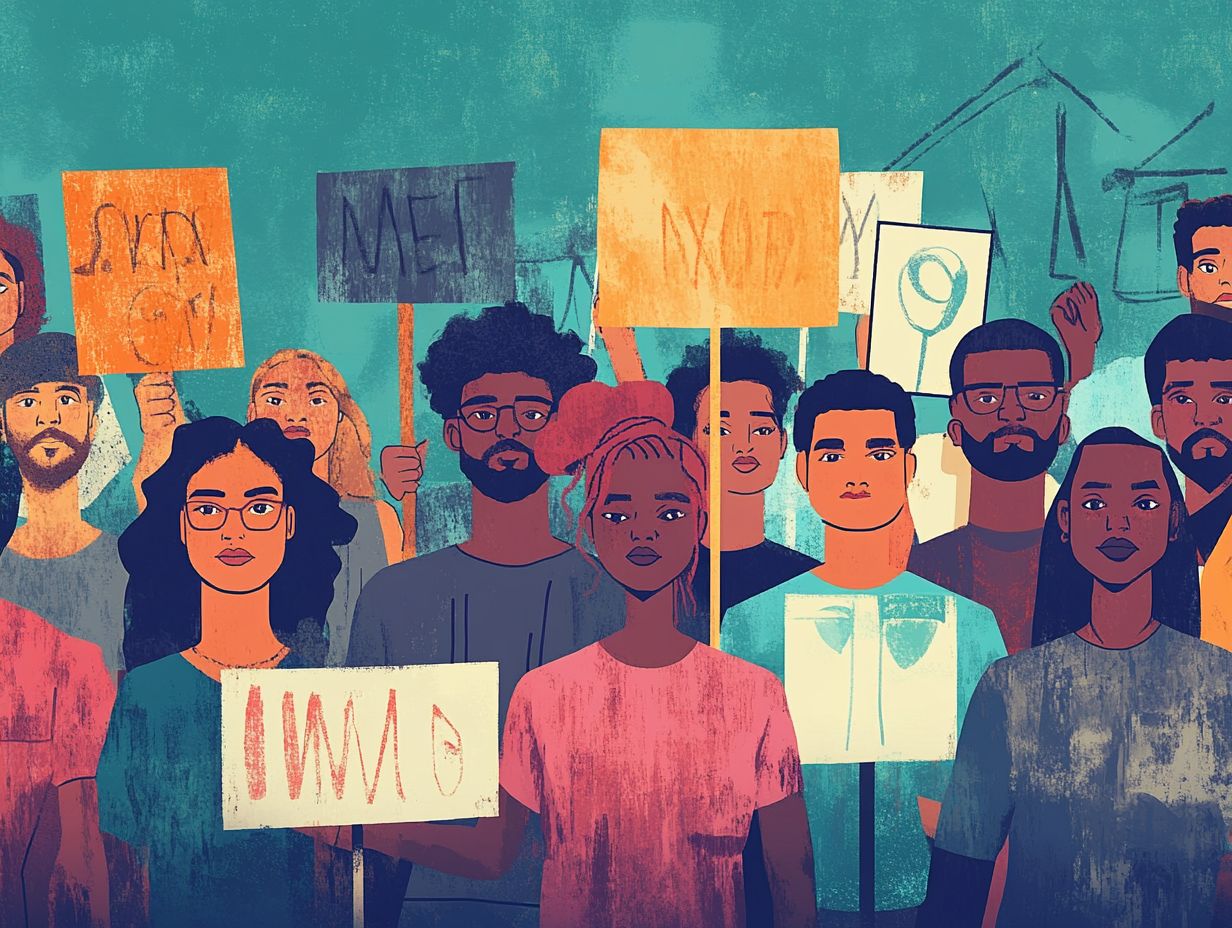
If someone violates your rights, you can take action immediately! You have the opportunity to seek redress through various legal channels in the U.S.
Often, this journey requires the expertise of legal counsel to help you navigate the intricate landscape of civil rights protections and remedies.
These professionals are essential in ensuring that you fully understand your options and can effectively advocate for your rights. Civil rights organizations also play a significant role in this process, providing resources, guidance, and unwavering support to those who have experienced rights violations.
Their tireless efforts highlight injustices, mobilize community action, and influence essential policy changes. With the combined strengths of legal expertise and civil rights advocacy, you can pursue your claims, challenge discriminatory practices, and hold accountable those responsible for violations.
This collaboration fosters a more informed and empowered community, ensuring that you and others have access to justice.
How Can You Advocate for Your Rights?
Advocating for your rights requires a keen understanding of the legal landscape in the U.S. By engaging with civil rights organizations and utilizing available resources such as legal counsel you can effectively promote and protect individual freedoms.
Utilizing the strength of community organizing allows you to unite with others to tackle common challenges and amplify your collective voice. Awareness campaigns play a crucial role in educating the public and policymakers, drawing attention to pressing issues that deserve focus.
When pursued strategically, legal actions can challenge unjust practices or policies, creating a ripple effect that fosters broader change. Collaborating with civil rights organizations not only enhances your advocacy efforts but also brings valuable resources and expertise to your cause, making your endeavors more effective.
Start learning about your rights today! Join a local civil rights organization and make your voice heard.
What Are the Consequences of Ignoring Your Rights?
Ignoring your rights can lead to profound consequences. This includes discrimination that affects whole groups of people, loss of freedoms, and a diminishment of civil rights protections within the U.S. legal framework. Ultimately, this jeopardizes both individual and collective liberties.
The Civil Rights Movement serves as a powerful reminder of the severe repercussions that come from silence and inaction. Individuals faced violence and oppression while courageously fighting for basic human dignity. That history should resonate today.
Marginalized communities face struggles that highlight the need for vigilance. Issues such as voter suppression and police brutality reveal that neglecting rights not only erodes trust in institutions but also stirs societal discord.
Your active participation in advocacy and informed civic engagement is vital for safeguarding these rights. Recognize that once rights are undermined, it can take generations to reclaim them. This highlights the importance of collective responsibility in the ongoing pursuit of justice and equality.
How Can You Protect Your Rights for Future Generations?
Are you ready to protect your rights for future generations? Here s how you can take action! Protecting your rights demands a proactive approach. This involves education, advocacy, and active engagement with civil rights initiatives to ensure that the hard-won rights in the U.S. are both preserved and expanded.
You must stay informed about the current legal landscape and grasp the historical context that has shaped those rights. By promoting awareness through community workshops, discussions, and social media campaigns, you can inspire others to join the fight for equality.
Engaging with civil rights movements enables a collective voice that amplifies demands for justice and change. Your role, along with that of skilled legal counsel, is crucial. These professionals tirelessly defend rights in courts, ensuring that the voices of marginalized communities are not just heard but truly considered.
Together, you can lay the foundation for a more equitable society for generations to come.
Frequently Asked Questions
What are the 10 rights you should never ignore?
The 10 rights you should never ignore are:
- The right to life, liberty, and security of person,
- The right to freedom from discrimination,
- The right to a fair trial,
- The right to privacy,
- The right to freedom of thought, belief, and religion,
- The right to education,
- The right to work and to just and favorable conditions of work,
- The right to rest and leisure,
- The right to an adequate standard of living,
- The right to participate in the cultural life of the community.
Is it important to know and understand these 10 rights?
Yes, it is important to know and understand these 10 rights as they are fundamental to maintaining a fair and just society. Knowing your rights can help protect you from discrimination, abuse, and injustice.
What is the significance of the right to life, liberty, and security of person?
The right to life, liberty, and security of person is a fundamental human right. It protects individuals from being arbitrarily deprived of their life, freedom, and safety. It is the basis for all other rights and is essential for the protection of human dignity.
Why is the right to privacy important?
The right to privacy is important as it protects individuals from unwanted and unwarranted intrusions into their personal lives. It allows individuals to maintain autonomy and control over their personal information while protecting them from surveillance and other forms of privacy violations.
What is the right to education, and why does it matter?
The right to education is the right of every individual to access quality education without discrimination. Education is essential for personal development, social and economic progress, and is a fundamental human right that should be accessible to all.
What should I do if my rights are being violated?
If your rights are being violated, it is essential to seek help. Document the violation, reach out to advocacy organizations, and consider consulting legal professionals to understand your options.
Know Your Rights
Are your rights being violated? Get help now! You can reach out to organizations or individuals who can assist you.
Report the violation to the authorities and seek legal assistance if needed.
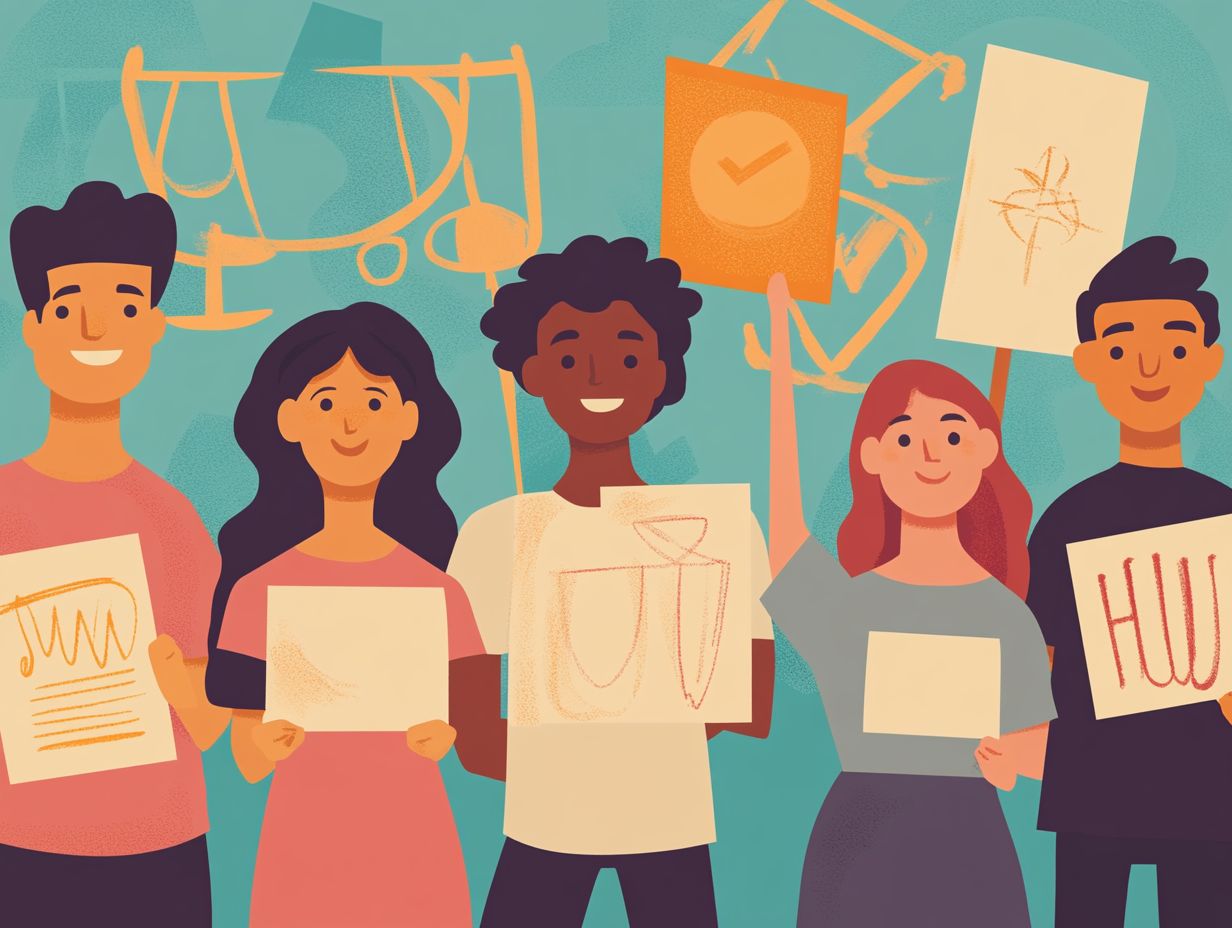
10 Fundamental Rights
It s crucial to understand these rights because they secure fairness in society. Knowing your rights helps protect you from discrimination and injustice.
The right to life, liberty, and security is essential. It safeguards your freedom and dignity.
Privacy is another important right. It helps keep your personal information safe from unwanted intrusions.
Everyone should have access to quality education. It s vital for personal growth and social progress.
If you feel your rights are being violated, don t hesitate. Seek help immediately!

